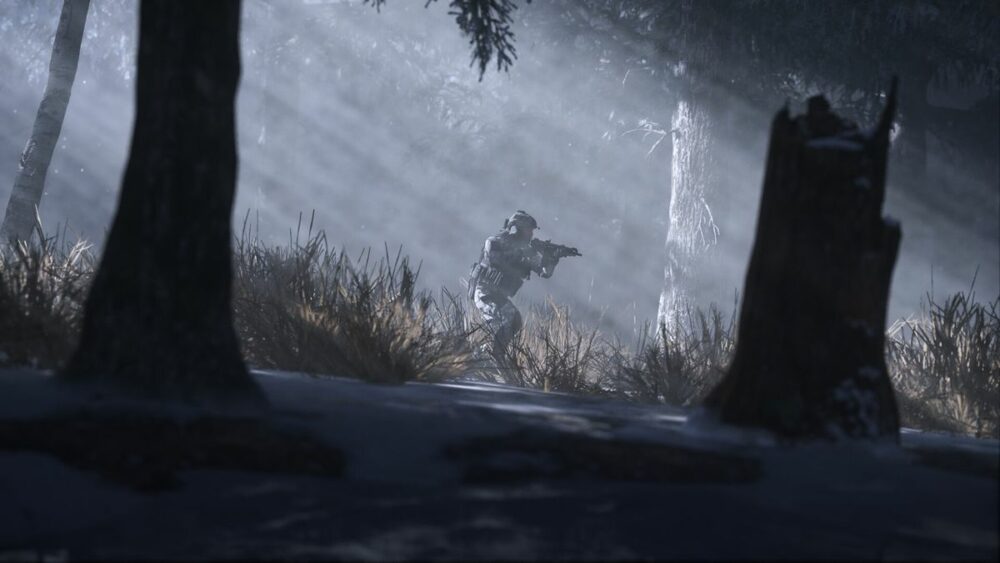Call of Duty’s single-player campaigns are known for their follow-along gameplay. You usually play as the member of a unit, a detachment, sometimes even an entire ground invasion. Your squad is often fronted by a competent and lethally effective leader. This leader selects which doors to breach, which bad guys to kill in which order, and which paths to follow as they stealthily guide you through enemy bases, surgically eliminating threats and occasionally getting into larger, more bombastic gunfights. For most of the Modern Warfare games in particular, that exceptional father figure has been the gruff, walrus-bristled Capt. Price, the mythological center of the Modern Warfare pantheon.
Modern Warfare 3 marks a shift, then: a few missions into the game, the camera zooms into his puffy cheeks and beady eyes as you, for the first time in the series (that isn’t a flashback), assume control of his corporeal form. No longer are you the young know-nothing who passively follows along; now you get to play as Call of Duty’s emotionally unavailable dad. But this shift is an uncomfortable one, and it reflects broader ways in which this third installment of the rebooted series has begun to take the games off of their familiar rails and into strange, unsettling territory.
Not only does who you play as change in Modern Warfare 3, but also how you play it. Far less time is spent in the original linear level structure that pervaded past games. Far more of Modern Warfare 3’s campaign is spent in what its developers call “Open Combat Missions,” which, in a single-player twist on the series’ popular Warzone offshoot, have your character air-dropping into a large arena where you are given relatively free rein to tackle objectives as you see fit.
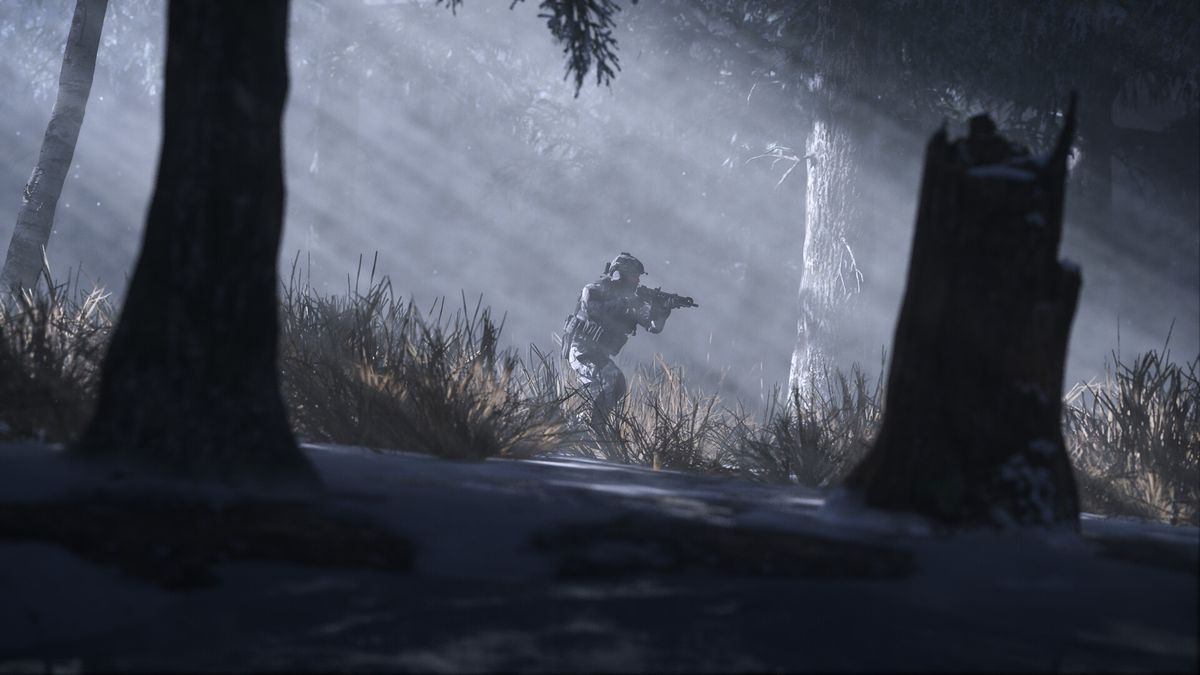
Your squad usually remains, if not physically near you, within close radio distance. They’ll check in with information about each mission’s objectives, as well as other points of interest to watch out for. For all intents and purposes, however, you are on your own. You, alone, must sneak around these spaces, trying not to tip off guards and attempting to figure out where you’re supposed to go. Where past Call of Duty games have taken their tonal cues from something like HBO’s Band of Brothers, Modern Warfare 3 feels a lot more like Rambo or American Sniper. Your team is dispersed, and you alone must bear the responsibility that the game constantly reminds you is yours: getting your hands dirty in order to stop bad guys who’d do the same.
The weight of responsibility feels greater, the unseemliness of your task more intense, when it’s just you, alone with the fallout of your actions. In one mission where you play as Kate Laswell, a CIA operative introduced in the 2019 reboot, you must infiltrate a Kastovian (an invented Soviet bloc nation) military base to meet with an informant. In order to gain access to the building where the informant is hiding, Laswell must kill an army major and his attending soldier, and take his identity card. Laswell justifies it to herself as a worthy sacrifice, and over the radio her ally blames it on the game’s villain, Vladimir Makarov. But there’s no one else around to grimly nod at the necessity of her actions, to spread the load of immorality. Soldiers at war, as horrific as their actions often are, come off much differently than a lone gunwoman, no matter how blithely she tries to shake off her own guilt.
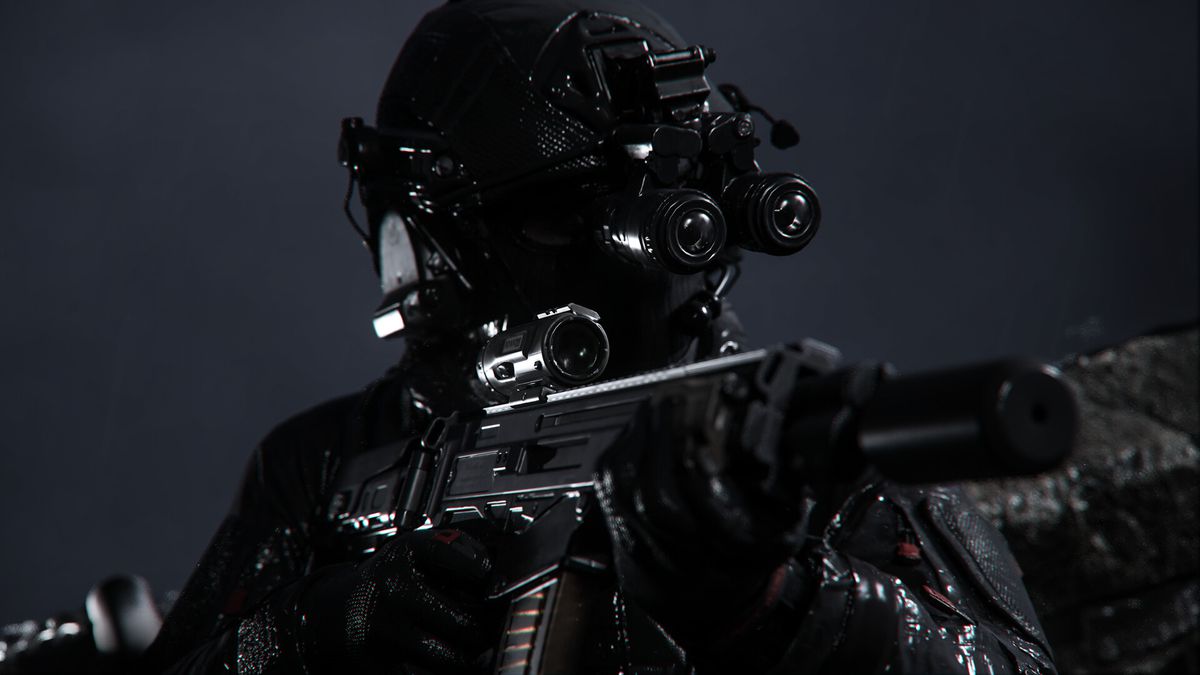
Even the game’s big narrative moment, its version of the original Modern Warfare 2’s infamous “No Russian” mission, has you playing as someone left all alone. You play as an Arab woman named Samara on a flight to see her family. The game’s Russian ultranationalist villains grab her and strap her into an explosive vest. They smugly admit that she plays the part of a terrorist well enough to pin the blame on an uninvolved Arab nation, and then push her out into the crowded cabin of panicked passengers who grab at her in fear and anger before her vest ignites.
Her isolation from her allies is meant to drum up players’ anger at the game’s villains. But the callousness of the anti-Arab racism the game references, the meaninglessness of it within the game, decontextualized from the real world, makes the moment feel unearned. The in-game nation of Urzikstan may be problematically fictionalized, but there was still something marginally meaningful in seeing the freedom fighter Farah Karim lead a group of fierce Arab women in overthrowing their prison guards back in the 2019 Modern Warfare campaign. That visual becomes distorted when one of those women is taken, singled out, and made into a solitary, sacrificial pawn, there to generate a sense of righteousness and rage at an already cartoonishly evil villain. In the next mission, Karim erases all evidence of the framed hijacking and Samara disappears forever. Her sacrifice serves no greater good, and has no meaning beyond exigencies of plot.
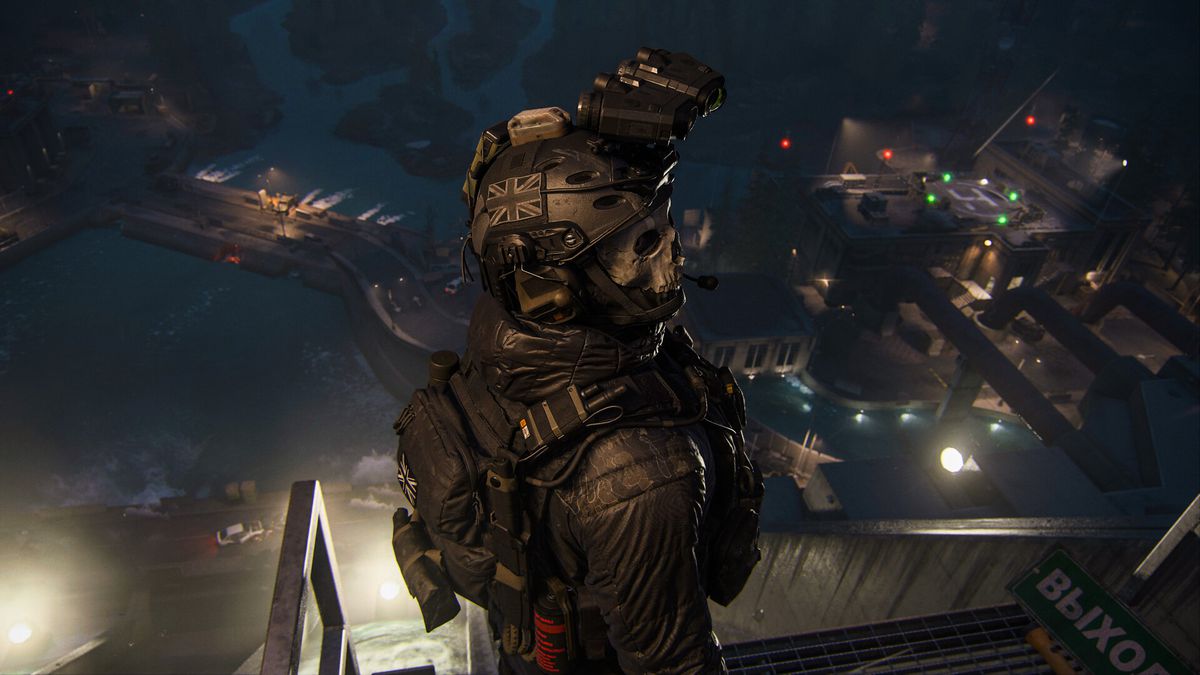
In previous Call of Duty games you were still committing war crimes, but you were rarely committing them alone. You were usually surrounded by like-minded soldiers, together, with you, in the proverbial shit. The games often pushed narratives of heroic troops, sacrificing their lives for one another, surrendering themselves to larger ideals. These ideals were often noxious and unjustifiable on closer examination; 2019’s Modern Warfare, for example, blames an atrocity America committed in the first Gulf War, the Highway of Death, on Russia; 2022’s Modern Warfare 2 kicks off with a direct reference to the extrajudicial drone strike of an Iranian major general. But all the same, it was still possible to understand that, beneath everything, these games were still invested in ideas of brotherhood and loyalty, in glamorizing the sacrifices of regular soldiers, while often criticizing the governments who sent them into war.
The distinction may seem unimportant, but I spend time on it because when you take away that sense of camaraderie, of being stuck together in the trenches with your brothers and your sisters, and when you, instead, make your game about feats of solitary heroics and stealth mastery, you remove part of the mask hiding the brutality at the root of it all. If my actions occur within a cinematic framework, with dramatic peaks and valleys, quiet moments and loud ones, I can be that much more easily swept away in the fantasy that the games promise: that sense of racing against the clock, fighting against impossible odds, and resisting the existential threat of terroristic boogeymen.
But if my moment-to-moment experience is more about meandering around a wide-open arena, taking silenced potshots at unsuspecting guards like a soulless, cigar-chomping Solid Snake, it becomes much harder to swallow the fantasy I am being fed.
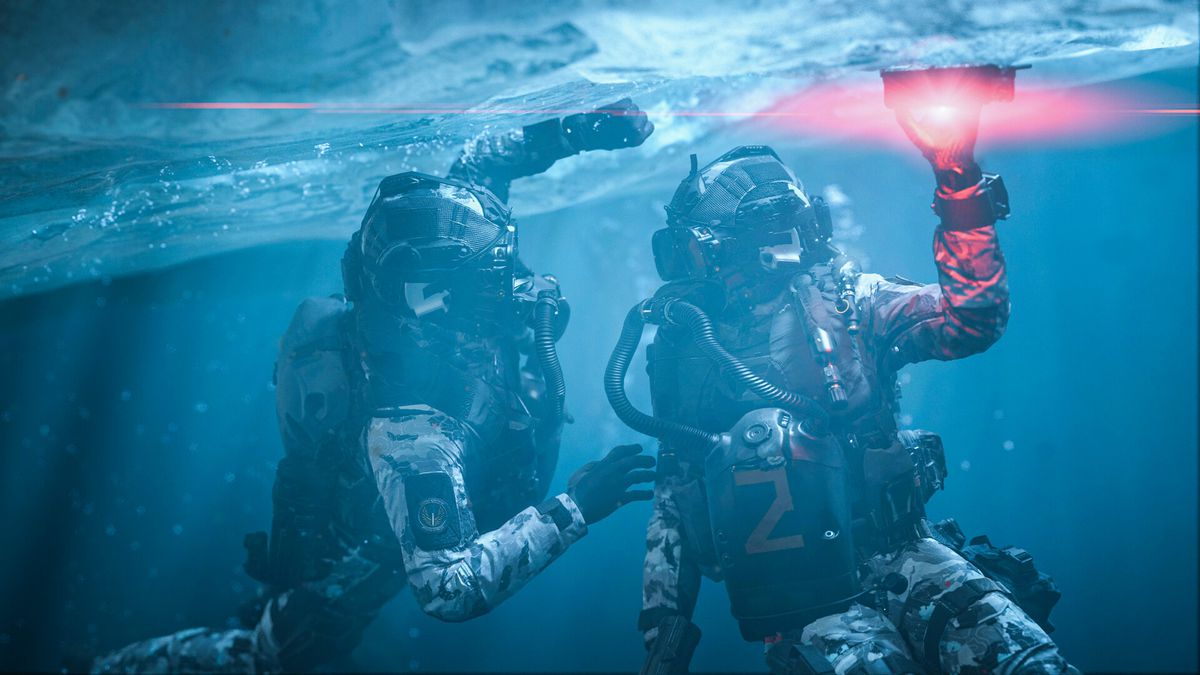
Vladimir Makarov may be back, and we do get to see much more of his villainous monologues and his sneering menace. But if, as a result of the game’s open-ended approach, I’m already feeling disconnected from any sense of momentum, sense of purpose, or connection to my teammates — if my experience is a choice between straightforward extermination or stealth mastery, in a stepped-down version of the game’s Warzone, which is itself entirely stripped of meaning and geopolitical context — what does it really matter who the villain is, or who the good guys are? Especially when both are often cast as members of abstracted and fictionalized nations in made-up locations?
Modern Warfare 3 has finally succeeded in unmooring the series entirely from history and from meaning. It continues the previous games’ practice of adding political texture to explosive ultra-violence, but it has never been more of a hollow shooting gallery, a ghost of a game and a departure from everything that may have once made the franchise compelling to play.
Call of Duty: Modern Warfare 3 will be released Nov. 10 on PlayStation 4, PlayStation 5, Windows PC, Xbox One, and Xbox Series X. The game’s campaign was reviewed on PS5 using a pre-release download code provided by Activision. Vox Media has affiliate partnerships. These do not influence editorial content, though Vox Media may earn commissions for products purchased via affiliate links. You can find additional information about Polygon’s ethics policy here.
- SEO Powered Content & PR Distribution. Get Amplified Today.
- PlatoData.Network Vertical Generative Ai. Empower Yourself. Access Here.
- PlatoAiStream. Web3 Intelligence. Knowledge Amplified. Access Here.
- PlatoESG. Carbon, CleanTech, Energy, Environment, Solar, Waste Management. Access Here.
- PlatoHealth. Biotech and Clinical Trials Intelligence. Access Here.
- Source: https://www.polygon.com/reviews/23949450/call-of-duty-modern-warfare-3-campaign-review
- 1
- 10
- 2019
- 212
- 220
- 28
- 7
- 8
- 9
- a
- About
- above
- access
- actions
- activision
- adding
- Affiliate
- Against
- All
- alone
- along
- already
- also
- am
- america
- an
- and
- anger
- Another
- any
- approach
- Arab
- ARE
- AREA
- Arena
- Army
- around
- as
- assault
- assume
- At
- attending
- away
- back
- bad
- base
- BE
- bear
- because
- becomes
- been
- before
- begun
- being
- BEST
- between
- beyond
- BIG
- both
- breach
- broader
- Brothers
- Building
- but
- by
- call
- Call of
- Call of Duty
- Call of Duty: Modern Warfare
- camaraderie
- Campaign
- Campaigns
- CAN
- card
- Center
- change
- character
- charge
- check
- choice
- CIA
- cinematic
- close
- closer
- code
- combat
- come
- commissions
- committed
- committing
- compelling
- competent
- connection
- constantly
- content
- context
- continues
- Control
- Crimes
- crowded
- developers
- direct
- disconnected
- dispersed
- distance
- distinction
- do
- does
- doors
- down
- download
- dramatic
- Drone
- drum
- each
- Earn
- easily
- Editorial
- Effective
- eliminating
- else
- emotionally
- enough
- entire
- entirely
- especially
- ethics
- even
- everything
- Evidence
- Example
- exceptional
- existential
- experience
- eyes
- Facility
- fallout
- familiar
- family
- FANTASY
- far
- Farah
- Fear
- Fed
- feel
- few
- Fighting
- Figure
- Finally
- find
- First
- first time
- fit
- flight
- follow
- follows
- For
- force
- forever
- form
- Framework
- Franchise
- Free
- Freedom
- from
- Fronted
- gain
- gallery
- game
- gameplay
- Games
- Gaming
- General
- generate
- geopolitical
- Get
- getting
- Ghost
- given
- go
- good
- Governments
- grab
- greater
- Ground
- Group
- guide
- gulf
- hands
- harder
- has
- Have
- her
- his
- history
- horrific
- How
- however
- http
- HTTPS
- i
- ICE
- ideals
- ideas
- Identity
- if
- ignites
- impossible
- in
- in-game
- inFamous
- influence
- information
- instead
- interest
- into
- introduced
- invested
- Is
- isolation
- IT
- ITS
- itself
- jpg
- just
- karim
- known
- large
- larger
- layer
- lead
- leader
- left
- less
- Level
- like
- links
- lives
- load
- locations
- longer
- looks
- lot
- LOUD
- Loyalty
- made
- major
- make
- MAKES
- marks
- mask
- mastery
- matter
- May
- meaning
- meaningful
- meant
- Media
- meet
- member
- Members
- menace
- Military
- Mission
- missions
- Modern
- moment
- moments
- Momentum
- more
- most
- much
- must
- my
- named
- narrative
- narratives
- nation
- nations
- Near
- necessity
- never
- New
- Newsletter
- Next
- Night
- no
- not
- notes
- nov
- now
- objectives
- Odds
- of
- off
- often
- on
- once
- One
- ones
- only
- open-ended
- or
- order
- original
- Other
- out
- over
- own
- pantheon
- part
- particular
- partnerships
- Past
- Patch
- patch notes
- PC
- pervaded
- plato
- plato data intelligence
- platodata
- platogaming
- play
- Playing
- plays
- playstation
- playstation 4
- playstation 5
- Points
- policy
- political
- Polygon
- Popular
- possible
- practice
- previous
- price
- prison
- Products
- promise
- provided
- ps5
- purchased
- purpose
- purposes
- push
- pushed
- put
- racing
- racism
- Radio
- rails
- rarely
- Real
- real world
- really
- reference
- references
- reflects
- regular
- relatively
- released
- remains
- remove
- responsibility
- result
- roundup
- Russia
- Russian
- same
- see
- seeing
- seem
- sense
- sent
- Series
- serves
- she
- shift
- shooting
- sight
- sign
- single-player
- Sledgehammer
- sneak
- solid
- Solid Snake
- someone
- something
- sometimes
- spaces
- spend
- spread
- stands
- Stealth
- still
- stop
- straightforward
- strange
- structure
- succeeded
- tackle
- Take
- taken
- taking
- task
- task force
- Team
- territory
- terrorist
- than
- that
- The
- The Game
- their
- Them
- themselves
- then
- there
- These
- they
- things
- third
- this
- those
- though
- threat
- threats
- Through
- time
- tip
- to
- together
- tonal
- toward
- trying
- twist
- two
- Understand
- unit
- up
- using
- usually
- version
- via
- W3
- war
- Warzone
- was
- Watch
- ways
- we
- weekly
- well
- were
- What
- when
- where
- while
- WHO
- Wikipedia
- will
- windows
- Windows PC
- with
- within
- woman
- Women
- world
- X
- xbox
- Xbox One
- xbox series
- Xbox Series X
- XML
- you
- young
- your
- zephyrnet
